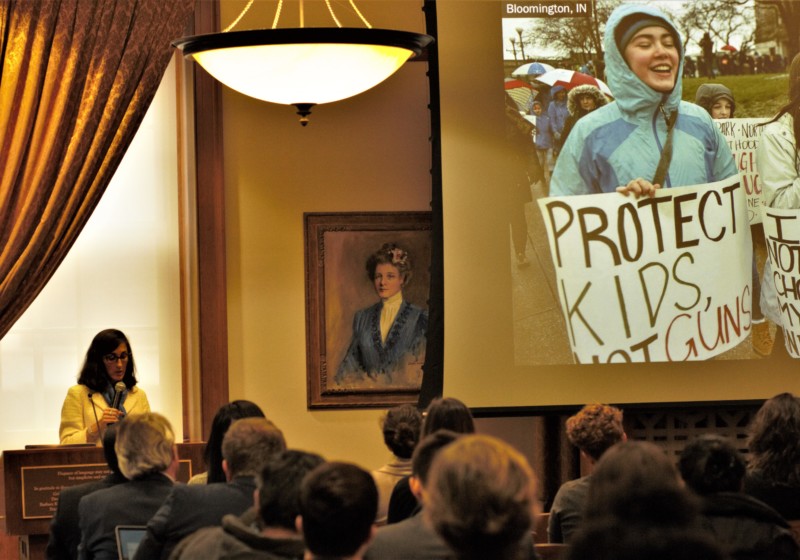Academics from UR and schools across the country talked guns and the cultural ideas around them last Thursday and Friday during the University’s “Social Life of Guns” conference.
“An object is never just an object,” said UR’s Kate Mariner, a professor of anthropology who played a key role in organizing the event.
Mariner hoped the conference would add more nuance to the conversation around guns in America and “deepen our understanding beyond right and left, white and black, innocent and guilty.”
The conference had been in the works for over a year and was inspired not by recent national shootings but by stirrings closer to home — the arming of Public Safety officers, an issue that sparked hot debate among students, faculty, staff, and the administration.
The emphasis on local affairs was clear during a community panel session, which featured three professors from the Rochester area.
“Gun violence is endemic in the city of Rochester,” Professor Kristin Doughty, who teaches anthropology, told the Campus Times.
Presenter and professor John Klofas from RIT found that a young person from certain areas of Rochester would have been exposed to about 600 shootings over the last 16 to 20 years.
The community theme continued with the screening of filmmaker Tam Little’s documentary “Move,” which details the tragedy and aftermath of the Rochester Boys & Girls’ Club shooting in August 2015. Her work is one example of the social efforts that organizers wanted to highlight — for every instance of violence, there are many more people working to solve the problem, Doughty said.
Conference speakers put gun violence in cultural contexts that blurred the dynamics at play.
Author Charles E. Cobb, a member of the Student Nonviolent Coordination Committee in Mississippi, argued that guns were in fact not central to the problem of gun violence. Rather, he said, violence itself has long been a central part of American democracy, and “a radical reset of our thought” was needed to fix the problem.
Professor Akinyele Umoja from Georgia State University built upon this theme by illustrating guns’ usefulness in protecting black people during the civil rights movement in the South.
He also argued that the National Rifle Association’s has been tellingly silent on the issue of black gun ownership.
“If you want stricter legislation on guns, a black man with a gun is the way to do it,” Akinyele joked.
Professor Alexandra Filindra from University of Illinois-Chicago explored this racial discrepancy at length during her presentation. Analyzing NRA magazines, she argued that white attachment to guns was a result of their heavy association with patriotism and virtue, a narrative influenced by NRA publications, which have only featured 10 people of color (with the exception of President Barack Obama’s multiple appearances) since 1967.
Lt. Gary Pudup, a member of New Yorkers Against Gun Violence and a conference attendee, has spent 30 years in law enforcement and owning guns. For him, the seeming intractability of gun violence can be linked back to the U.S. phenomenon of exceptionalism.
“One of the problems with the States is we’re so isolated. We think this [problem] is unique to us and [wonder] how are we going to solve this when it’s already been solved in Australia, it’s been solved in Canada,” Pudup said
But he thinks there’s a growing aura of hope that cannot be ignored.
“Every time we have one of these mass shootings I’ve sat back and thought, ‘Yeah, people will talk about this for a while and it’ll go away.’ But your generation, this means something different to them, and […] if we’re not at the tipping point, we’re very close to it.”






